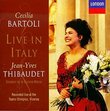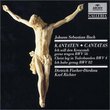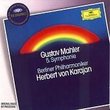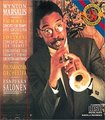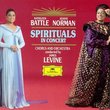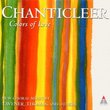| All Artists: Georg Philipp Telemann, Ludger Remy, Telemann Chamber Orchestra, Dorothee Mields [or Blotsky-Mields], Jan Kobow Title: Telemann: Der Tod Jesu Members Wishing: 1 Total Copies: 0 Label: Cpo Records Release Date: 5/16/2000 Genre: Classical Styles: Opera & Classical Vocal, Historical Periods, Baroque (c.1600-1750) Number of Discs: 1 SwapaCD Credits: 1 UPC: 761203972029 |
Search - Georg Philipp Telemann, Ludger Remy, Telemann Chamber Orchestra :: Telemann: Der Tod Jesu
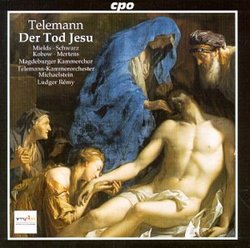 | Georg Philipp Telemann, Ludger Remy, Telemann Chamber Orchestra Telemann: Der Tod Jesu Genre: Classical
|
Larger Image |
CD DetailsSimilarly Requested CDs |
CD ReviewsGood Old Telemann John Middleton | Auckland, NZ | 03/22/2006 (5 out of 5 stars) "This CD is very special. No matter how often I listen to it I always want more. The work comes from Telemann's wondrous old age - just one of many remarkable (mostly large-scale) vocal works that he composed in his 70s and 80s. Der Tod Jesu gives us everything from drama and melodic beauty to profound gravity. Memorable arias and duets are mixed with wonderful choruses, all with colourful orchestral contributions. It is interesting to note that at the same time, a younger contemporary of Telemann's (C.H. Graun) set the same text to his own Der Tod Jesu. They even compared notes and performed each other's versions. The Graun is generally lighter in style and possibly less compelling, but still well worth getting to know. For me however, the Telemann is the greater work and should be in the colletion of every fan of this truly remarkable man. In this recording the soloists, choir, orchestra, conductor, and recording crew do Telemann proud." A Hero's Death Giordano Bruno | Wherever I am, I am. | 09/01/2009 (5 out of 5 stars) "There's nothing meek or morbid about Telemann's 'Jesu' in this passion oratorio. This is a confident muscular Jesu, closer to the Saxon Heliand than to the Man of Sorrows depicted on the CD cover; the first aria proclaims Him a hero: "Du Held... du kannst und willst mein Schutzgott sein." (You Hero... you can and will be my Protector-God.) Before that, the Siegfriedesque cantabile for horn that opens the composition sounds not so much like a lament as a call to don one's spiritual armor, and throughout the whole text Jesu is portrayed as indomitable amid the torment and agony of his followers. Specifically, He is the Lion of Judah, the model of Christian fortitude against all enemies. Yes, there are also moments of anguish in the text and poignancy in the music, but overall this is a depiction of the Passion as a Triumph. Whether that concept accords with your personal theology, dear Music Fan, is your own concern. As for me, I love the music too much to be antagonized by mere dogma.
Telemann was seventy-four years old when he composed De Tod Jesu for concert hall rather than congregational performance. The text was written by Karl Wilhelm Ramler, a literary academic less than half the composer' age and a disciple of the famous poet Klopstock. Ramler outlived Telemann long enough to be ridiculed by Goethe and Schiller for his arrogance and pedantry, but it seems the composer liked his work and chose it for several cantatas. Recitativos and arias for basso dominate Der Tod Jesu, with arias for alto and duets for basso/alto or basso/tenor being prominent. In short, this is a robust, masculine sanctity befitting, I think, the brisk independent optimism of the citizens of Hamburg, for whom it was written. Basso Klaus Mertens sings the 'Lion's Share' of the 'accompagnato' recitations, with flair and polish. Mertens shows up on CDs by virtually every consort, under every major North European conductor; to my ears, he's at his best and most expressive under Ludger Rémy. The obbligato accompaniment in this oratorio is marvelously varied, matching the chosen instrument to the affect of the singer imaginatively. Britta Schwarz has a proud womanly alto, warm and complex, not a counter-tenor's smooth simplicity of timbre; she matches Mertens perfectly. Soprano Dorothee Mields isn't heard until her recitativo in Part II (track 20), but she's worth waiting for -- a vibrant voice with superb control of pitch. Tenor Jan Kobow has the smallest role but handles it beautifully; his duet with Mertens -- "Weinet nicht! (Weep not!), the penultimate movement of the oratorio -- is an effective conclusion to this musical exhortation to live courageously in faith. Der Tod Jesu is widely regarded as one of Telemann's finest compositions. I'm willing to agree." |

 Track Listings (32) - Disc #1
Track Listings (32) - Disc #1